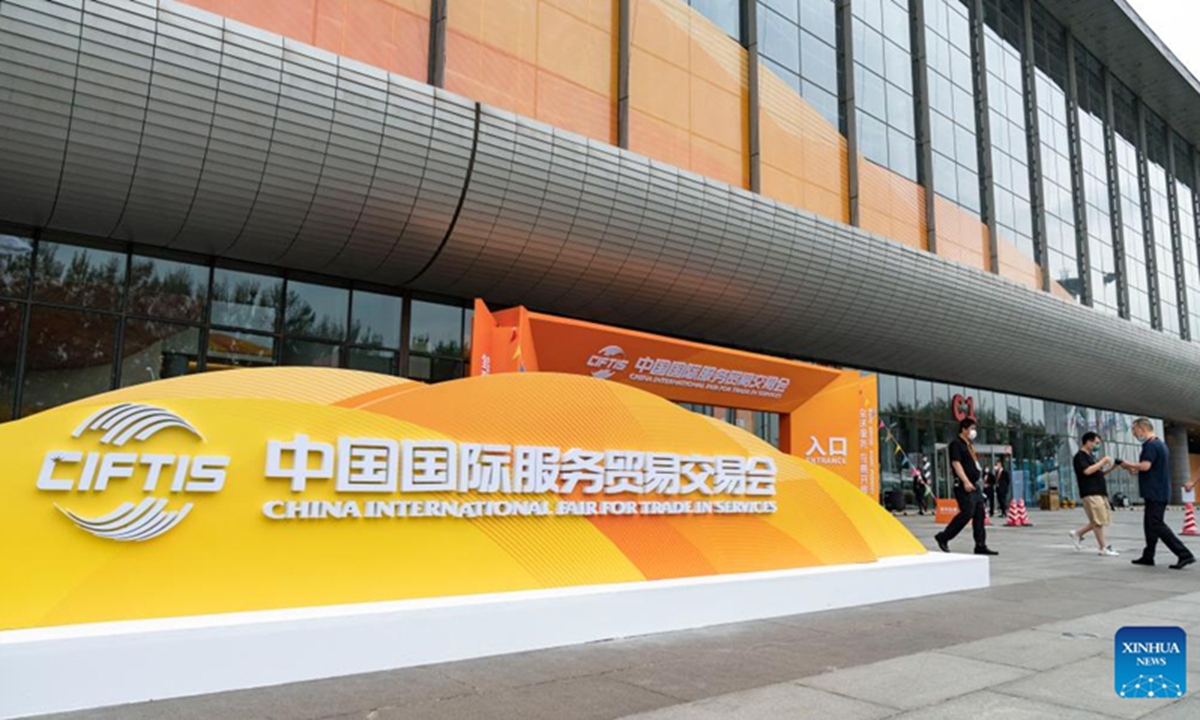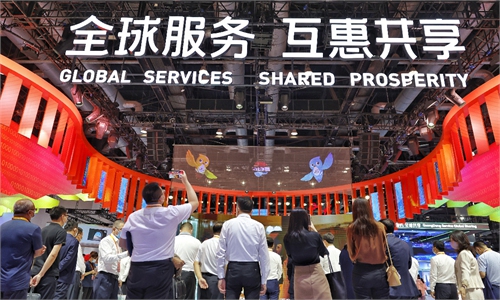Openness or isolation? China and US have given different answers: Global Times editorial

Photo taken on Aug 28, 2022 shows an entrance of the China National Convention Center, one of the venues of the 2022 China International Fair for Trade in Services (CIFTIS), in Beijing, capital of China. The 2022 CIFTIS will be held at the China National Convention Center and the Shougang Park in Beijing from Aug 31 to Sept 5.Photo:Xinhua
Faced with the question of the times - "Openness or isolation? Progress or retrogression?" - China and the US, the world's two largest economies, have made increasingly clear choices. Two topics that have recently attracted much international attention have happened to demonstrate different pictures of two choices and two trends.
One is the six-day 2022 China International Fair for Trade in Services (CIFTIS) that opened in Beijing on September 1. More than 400 Fortune 500 companies and leading international companies are participating in the exhibition, and 71 countries and international organizations have set up exhibitions and conferences in the names of countries or headquarters.
The other is that the US was revealed to have once again escalated restrictions on technology exports to China for inexplicable reasons. It introduced a series of bans, including prohibiting two US companies ? Nvidia and AMD ? from selling top computing?chips?for?artificial intelligence?to?China, which has continued to impact the stability of the global supply chain and economic recovery. These two events happened to take place on the same day, forming an unusually drastic contrast.
As an important platform for China to expand opening-up and deepen cooperation, the CIFTIS has formed a "matrix" of economic and trade events with the China Import and Export Fair, or Canton Fair, and the China International Import Expo, better known as CIIE. The CIFTIS has experienced 10 years of development, during which, China's total trade in services has ranked second in the world for eight consecutive years, and the accumulated?services?imports have exceeded $4 trillion. Trade in services has become a window for mutual beneficiary and mutual development between China and the world. Against the backdrop of rising trade protectionism and anti-globalization currents, China is unswervingly promoting a high level of opening-up, which has not only formed a valuable certainty, and enhanced confidence in the international market and optimistic expectations for the future, but also injected new impetus for the world's continuous and steady economic growth.
On the contrary, as a typical political manipulation to seek "decoupling," the US has continuously upgraded its restrictions on technology exports to China. This is an embodiment of its isolation and distortion against globalization, and the anxiety over the decline of its hegemony. From the US president formally signing the Chip and Science Act to export controls on four technologies including restricting?China?from producing logic chips using a?14nm-class fabrication process and blocking China's access to advanced electronic design automation (EDA)?software, to the ban on Nvidia and AMD selling some advanced chips to China, US' abuse of export control measures and escalation of technological restrictions on China have become crazy without due consideration for the expansion of collateral damage.
At the juncture when the Russia-Ukraine conflict is ongoing, inflations in the US and Europe are high, and the world is suffering from supply chain disruptions and low growth expectations, the negative impact of Washington's perverse actions on the global economy is clear to see. It's unrealistic and impossible for the US to promote "decoupling" in high technology, and even the US public opinion has questioned its effectiveness. Further restrictions on technology exports to China will not only increase the instability of the global economy, but are also likely to be counterproductive in practical terms. It's clear that the US has become so anxious and even fearful of China's rapid development that it has messed up by not playing by the rules. China and the US are increasingly moving in opposite directions in terms of mentality: One is open and confident, and tries to embrace the world, while the other is slipping into isolation and conservatism in its lack of confidence.
The different choices made by China and the US reflect the diversity of two concepts. Starting from building a community with a shared future for mankind, China insists that working together for mutual benefit is the only right choice, and is therefore willing to work with the world for mutual achievement in openness. But the US, which claims at every turn to be the "defender" of today's world order, is increasingly devoid of thinking about the world in its worldview, and even makes suppressing China all of its worldview. It's sad, we have to say it's sad.
As we all know, all living organisms need metabolism, otherwise life will stop. The same is true for a country, which cannot avoid decline, if it has slipped into isolation, no matter how powerful it is. Washington elites need to reflect on lessons of history. We firmly believe that people cannot beat the general trend, and the US needs to accept the reality at the end of the day. For China, the more it faces the US government's blockade and restrictions, the more it has to raise the level of opening-up to the outside world, making new space for China's economic development and adding new momentum to the world's economic recovery and growth.

